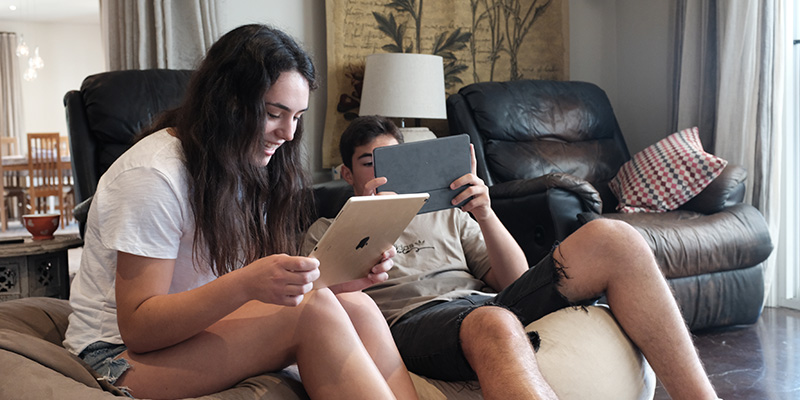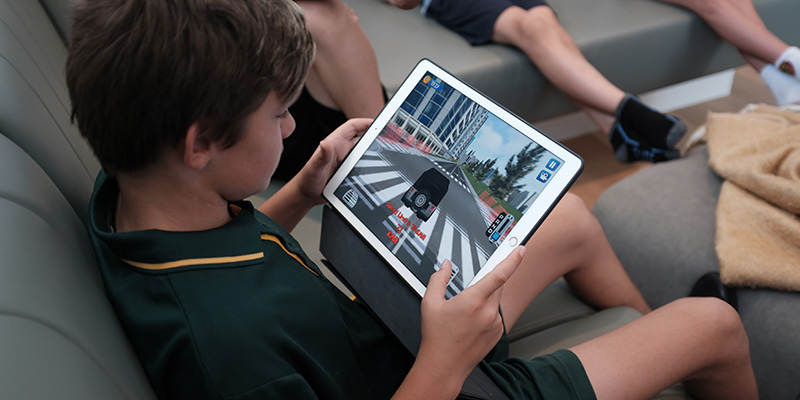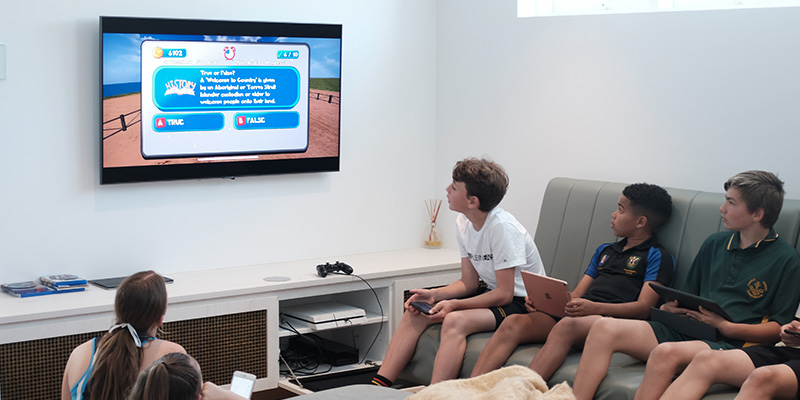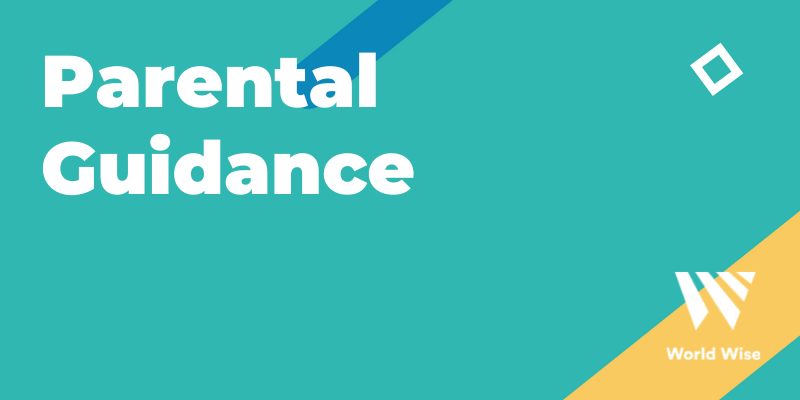With fighting at an all-time high, just how do we resolve the conflict over device use in our families?
Love it or hate it, there’s no denying that Channel 9’s reality show Parental Guidance has sparked the conversation about modern day parenting. Not only does it bring the diversity of our challenges to the fore, but also highlights the emotional impact of those challenges on families.
It’s clear that, regardless of the type of parenting style you embrace, parenting today is highly emotive and more intense than ever before.
But why?
Parenting without a framework
We make sense of parenting by using our own childhood as a framework. As adults, we often emulate this experience. Love it or hate it, it’s why we regularly find our own parental behaviour mimicking that of our parents.
This was all well and good when parenting challenges existed in a world that was purely physical – a world familiar to us all. But with rapid technological development, we’re in unfamiliar territory, fighting battles that are completely unique to our time. Where do we even begin navigating the variety of challenges arising from parenting in a digital world?
Digital disharmony in the home – is it a question of perspective?
As parents, we’re constantly asking questions about the psychological, emotional and physical impact of technology on our children. It’s only natural – they’re vulnerable and in need of our protection.
But with no answers, just how do we successfully navigate the challenges inherent to ongoing technological advancement? It’s no wonder that we’re often cynical, fearful and hesitant about a world driven by digital engagement. Yet our children, who know no different, explore that world without hesitation.
And this is where the conflict begins.

Two perspectives, one relentless conflict
As parents, we’re desperately reconciling the old – our ‘normal’ – against the new. But for our children, new is their ‘normal’.
So while us Gen X parents have been part of the transition from face-to-face to virtual engagement, our children haven’t. To them, screen time is a natural part of their day. To us, it’s far from natural.
Recognising what influences our mindset
As parents, we’re learning to grapple with a host of new platforms ourselves. At the same time, we’re trying to effectively lead our children through managing them. But with no framework to guide us, it’s only natural that we’re suspicious and tentative.
The way we bank, shop, learn, communicate and socialise has changed. Even the way we manage our work and education has evolved, with virtual meetings and classrooms now commonplace.
It’s no wonder we’re uncertain, and it’s why shows like Parental Guidance are so compelling. We watch – and empathise – as the reality show parents struggle to understand the intensity of their children’s attachment to technology.
Parental Guidance may provide only a snapshot of the conflict over screen time and digital engagement. But evidence shows that 65% of Australian parents agreed that negotiating digital technologies use causes conflicts in the home (Graham, A & Sahlberg, P (2021). Growing Up Digital Australia: Phase 2 technical report. Gonski Institute for Education. UNSW, Sydney).
We need to ask why. As modern parents, we’re tasked with leading our children while also learning to navigate the way ourselves.
Our children were born into the digital era and know no different. But has the unsettling process of unlearning previous behaviours and learning new ones generated an unconscious bias in us as parents?
Devices aren’t all good – but they’re not all bad, either
We’ve had no choice but to critically navigate the differences brought about by technology. But has this meant that we’ve polarised technology as the enemy and lost sight of the fact that, for our children, it’s their normal?
Like most stereotypes, blanket assumptions are not only often wrong, but they drive wedges between groups. As parents, could our recognition that our habits are not necessarily the same as those of our children reduce family friction?
Take communication, for example. Our grandparents lived in a time where the written word was shared via letters. Our generation (we’re both mid-40’s) relied on primarily verbal communication – over the phone or face-to-face. Today, our children live in a world of instant visual or text engagement. Now we naturally assume this to be a negative, just like our grandparent’s response to typewriters (‘we’ll lose the art of handwriting’). But isn’t device-driven engagement just modern-day snail mail?

Is device really a dirty word?
As parents, we’re the first to say that managing the digital world and ‘excessive’ screen time is a challenge. But we also believe that it’s important we don’t demonise the term ‘device’. The pandemic highlighted the positives, with devices enabling children to not only keep up their education remotely, but also connect with friends and family during periods of isolation.
Contextually, devices are the tools that we all use to do our work, learning, socialising and playing. They’re a tool that facilitates an activity.
What we’re saying is that, as parents, are some of our concepts outdated? Are we throwing a blanket assumption across all device use today, when it is significantly different to how it was used yesterday, the day before, and the day before that?
Screen time is a perfect example. Some screen time does need to be limited – namely, passive consumption, such as social media. However our consumption can also be active, based around creativity and connection. This suggests that we need to revisit our blanket assumptions and the unconscious bias that underpins them.
Resolving the digital conflict in families
Parenting is tough enough without the additional challenges presented by technology. One strategy to temper the conflict with our children is to help them get the best of their devices. World Wise was developed purely for this reason.
Because as parents, we need to recognise the contextual shift that comes with rapid technological change. And we need to act on it.
Our perspective and engagement with technology is truly different to that of our children’s. If you’ve read The Hitchhiker’s Guide to the Galaxy, you may have heard of Douglas Adams’ (author) take on to technological advancement:
- Anything that in the world when you’re born is normal, ordinary and a natural part of the way the world works. (That’s our children.)
- Anything that’s invented between then and aged 30 is incredibly exciting and a potential career option. (Again, our children – and possibly grandchildren.)
- Anything invented after you turn 30 is against the natural order of things and the beginning of the end of civilisation as we know it – until it’s been around for about 10 years, when it gradually turns out to be alright. (Yep – the end of civilisation as we know it. That’s us.)
Although tongue in cheek, applying this to parenting today really shows the difference in generational perspective.
Our children see these devices purely as tools – tools for communication, socialising, entertainment, learning. As parents, though, we see them as a threat to how those things have always been done and how we’ve been taught to do them.
But does that necessarily make it right?

Do you struggle with parenting in a digital world?
Traversing the digital world effectively seems to be the overarching nemesis of almost every parent.
But it’s not all fear, guilt and overwhelm. We’re living the challenges today, just as you are. And it’s where World Wise came from – we wanted our children to be active drivers of their digital consumption, not passive recipients.
What are your thoughts and struggles? Please share them – we’d love to know!
Author bio
We’re Julie Samus and Tanya Alexander, co-founders and creators of the World Wise App. With 8 children between us, we’ve lived the mayhem of juggling multiple extra-curricular activities. We’ve also felt the guilt as waiting siblings became passive users of technology to pass the time.
So we created World Wise, transforming that passive consumption into active engagement.
And while progressive learning makes it suitable for kindergarten to (roughly) Year 9 students, the gaming platform means big kids love it, too.
It’s a game changer – literally.


Recent Comments